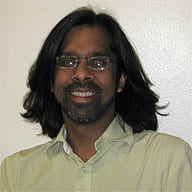“…The obvious things also need to be explained. Often there are deep explanations…”
 An interview with Sandeep Prasada, PhD
An interview with Sandeep Prasada, PhD
Department of Psychology, Hunter College, CUNY
By: Michelle Johnson, 10/25/19
Did you always know you wanted to study psychology?
I worked at a school for exceptional children with special needs. My mom was a teacher there, and I worked with those kids as an assistant teacher and a camp counselor in the summer. I really enjoyed working with these kids, and the school had a number of psychologists who helped the teachers with the curriculum and handling behavior problems, things like that. That’s what got me interested in potentially becoming a psychologist. When I started taking courses in psychology, I quickly felt that we didn’t know enough in psychology for me to be a clinical psychologist. A lot of clinical psychologists help a lot of people, thank goodness they do. But for me, it felt like there was not enough known, and I wanted to help figure those things out.
What questions are at the front of your mind right now?
My research is on how we learn words and form concepts for simple things like “table,” “chair,” “dog,” or “tree.” Kids acquire these very quickly and easily in most cases. If we poke at these words, we see they’re actually quite complicated. You use the word “dog” to talk about Fido or Spot or Rover, but you also use it to talk about the category of dogs, right? You could say, “Dogs evolved from wolves,” and when you say that, you’re not talking about Fido or Spot or Rover, you’re talking about a whole category of dogs. We know that two-year-old’s and three-year-old’s say things like, “Birds fly,” when they’re not talking about one [specific] bird, but they’re talking about birds generally. I’m interested in how children and adults are able to do this. You see only a few dogs or a few birds, and you jump to a conclusion about the whole category. How does that happen?
Relatedly, you might see various dogs and notice that many of them have four legs. Somehow, we jump to the conclusion that they’re supposed to have four legs, and if they don’t, there’s something wrong with them. Why don’t we simply think the ones that don’t have four legs are merely atypical? We form different kinds of generalizations for simple categories, and sometimes we end up thinking certain things are supposed to be a certain way.
I start by looking at how we as grown-ups use and understand these words, and that’s where we see a lot of this complication. Then the next step is to try to see if young kids also understand words in these complex ways. Most of the time it turns out that they do, which makes the mystery even more interesting.
What’s some of the best advice you’ve ever gotten?
Noam Chomsky impressed upon the students in his class (which included me) to “Question simple explanations.” Everyone knows that if you let go of an apple, it’s going to fall. There’s nothing surprising about that. But if you ask, “Well, why doesn’t it go sideways? Why doesn’t that go up? Why does it go in a straight line as opposed to in a complicated trajectory?” That’s where science begins. People will often say that perhaps a lot of psychology is obvious. Well, a lot of things we think are true turn out not to be true, and the obvious things also need to be explained. Often there are deep explanations for the obvious, but you’re not going to find them if you just assume that it’s obvious and there’s nothing to explain.
The other piece of advice came from my thesis advisor, Susan Carey, in graduate school. A bunch of graduate students had gone to a talk, and we thought it was perhaps not the best talk. We were chatting about why we thought this was not a great talk or great research and so on and so forth. Susan pointed out that, “Look, I agree with you that it might not be the best talk I’ve heard or the deepest question, but it’s not useful to spend one’s time criticizing it in that way.”
She said that when she is in a talk in which she feels perhaps someone is not asking the right question or pursuing things in the right way, she always tries to sit and think about, “What would’ve been the right question? What would have been the right way to answer this? From what they actually did do, what can we learn from it?”
To learn more about Dr. Prasada and his work, click here.
Click here to go back to the “Interviews with Scientists” page.



